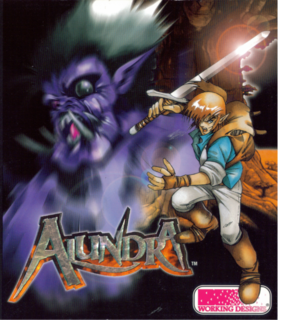While the end game drags quite a bit, it doesn't tale away from the engrossing story and smart, brain-taxing gameplay.
Youthful, lost-soul hero searching for his destiny? Check. Collect artifacts to open the way to an end boss? Check. An assortment of items and weapons to assign to two buttons? Check. It all reads "Zelda", but Alundra proves itself in other ways. Discovering he's a Releaser, Alundra learns he can enter dreams of others--a good thing since people are being slain in their sleep by powerful nightmares, and only he can save them. Of course, finding out who is behind this nocturnal invasion, and why, becomes the central theme of the game, so it's a good thing the well-defined personalities of all you meet make you actually care about saving them. From the surfer-dude, to the old crone, the village of Inoa is packed with interesting people ready to help and be helped. The story twists and turns at just the right places, with enough twists to be interesting, but not so many as to defy reason. Spread across a map of 20 segments, the world around you holds many terrains to be explored to locate crystals that will unearth a sunken shrine, where Alundra will fulfill his fate. A few secrets also await, and without help you likely won't find them all, but the ones you get will be well worth the effort.
While many games of this nature have fairly standard, cookie-cutter dungeons, Alundra's use of two distinct dungeon styles makes it stand out in a good way. The dungeons of people's dreams are more ethereal and ghostly, and it helps break the monotony that can come from dungeon-crawling. The soundtrack is wonderful, with hum-worthy anthems that never grate the nerves. Humor is tossed around just enough, with clever riffs on modern pop culture that help keep the otherwise very somber story from completely depressing you. It also shows that the translation was done very well from the Japanese original, and there's surprisingly not a wisp of Engrish to be found.
The only real serious issue is the end of the game, as it drags on more than is necessary and feels like an unneeded impediment to completing the game. It becomes a far too labyrinthine and punitive, and as you're in no serious danger, the endless puzzles you work through in the sunken shrine to get to the game's end are less fun than earlier dungeons when you at least had a little fear to keep you motivated. The view when needing to complete a series of jumps on platforms often fails you, though luckily it mostly means you merely have to start over, as you can't fall to your death. Analog support would've been nice, but isn't a deal-breaker. Buying herbs from a shop is oddly tedious and stupid, as not only do you grab the item you want and toss it in front of the shopkeeper to buy it, but you can only buy one with each toss, leaving you to go grab it again and repeat. Thankfully herbs are the only thing you can have more than one of (and only nine total at that), but going in to buy seven herbs should not be so complicated.
The controls are tight and laid out in a logical manner, and the multiple jumping issue aside the games runs well. The graphics have a nice old-timey feel to them, and the font used for the text is very appealing. The soundtrack clearly outweighs the otherwise standard sound effects. Barreling through the game will take easily 40 hours, longer if you like to explore, so there's good value for your money. Alundra simply manages to carve its own little niche in the RPG landscape that will leave fans of similar games very satisfied, and not feeling like they just played a cheap imitation of a favorite.

